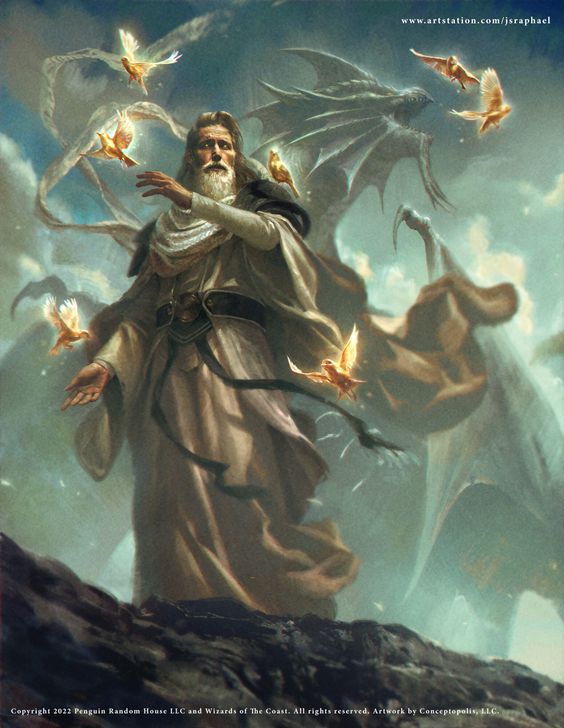Bahamut
Bahamut (pronounced: /bɑːˈhɑːmʌt/ ba-HA-mut or: /ˈbɑːhɑːmʌt/ BA-ha-mut) was the dragon god of justice and a subservient deity to Torm, god of law. Before entering the Euronian pantheon, he was a member of the Draconic pantheon, as a deity of good dragons, metallic dragons, wisdom, and enlightened justice (justice tempered with mercy and punishment with forgiveness) known by the name of Xymor (pronounced: /ˈzaɪmɔːr/ ZIE-more). For some time, he was also a member of the Untheric pantheon, under the alias of Marduk.
His natural form was that of a platinum dragon, said by many to be the only one of his kind. He was also the eternal rival of his sister Tiamat, queen of the chromatic dragons.
Divine Domains
war, life
Divine Symbols & Sigils
As with any dragon deity, dragons who wanted to become clerics of Bahamut had to first acquire an appropriate holy symbol. This holy symbol became the most prized item of their hoards after that, as it was a symbol of their status in dragon society and of the cleric's devotion to Bahamut, and to lose it was considered a blasphemy. If a dragon cleric didn't try to recover a stolen or lost holy symbol, he or she would lose their investiture. Usually a dragon had to acquire his or her holy symbol on their own, but Bahamut also bestowed a holy symbol to a dragon he wanted to be his cleric.
The holy symbol used by dragon clerics of Bahamut was a small dragon claw (about the size of a human hand) usually made of platinum or some other metal plated with platinum, although younger (and relatively poorer) dragons made theirs of their own metal type. They carried their holy symbol at all times, usually around their necks on a stout chain. One of the main goals of a dragon cleric was to acquire their most preferred type of holy symbol; in the case of Bahamut's worshipers, this was one made of platinum
Tenets of Faith
Bahamut's dogma was based on justice, nobility, protection, and honor. He taught his followers to always uphold the highest ideals of honor and justice; to be constantly vigilant against evil and to oppose it from all fronts; and to protect the weak, liberate the oppressed, and defend just order. Bahamut advocated a "greater justice" that included fighting against evil and toppling oppressive regimes. He also liked to reward strength of purpose and character in his followers.
His dragon adepts followed the Ptarian Code, a draconic code of honor created by the gold dragon Ptaris in the ancient past. Originally intended as a code of conduct for the lords who attended the King of Justice, the Ptarian Code eventually was adopted by many gold and silver dragons. The Ptarian Code was similar to the codes of chivalry adopted by knightly orders of humanity. It included paying homage to Bahamut, as well to the draconic deities Lendys and Tamara. The major precepts were:
Justice and Good above all.
Honor and Fealty to the King.
Honor and Respect to Righteous Innocence.
Honor and Duty to the Balancer (Lendys), to Her Mercy (Tamara), and to the Justicemaker (Bahamut).
Honor and Protection to the Lesser Races.
Honor and Correction to the Enemies of Justice and Good.
Honor and Forbearance for oneself.
Holidays
Bahamut's worshipers and clergy had no formal rituals or ceremonies. Those who followed the Platinum Dragon believed in the philosophy of "praying through their deeds". The only activity that was considered as something like a ritual was the Rite of Rebirth, the magical process by which non-dragon humanoids transformed themselves into dragonborn
Physical Description
Special abilities
Despite his aversion to battle, he was easily capable of defending himself. Along with all the standard powers and godly senses of a deity of his rank, as well as the natural abilities of an ancient dragon, those who saw him fight claimed that he had two breath weapons, one a powerful cone of cold, the other a vapor that turned his enemies into gaseous forms. A third special attack was his roar, which was so powerful that it could disintegrate creatures or objects within 100 feet (30 meters). If facing off against more powerful creatures, this roar would still permanently deafen those who weren't turned to dust. On top of that he was more powerful than any mortal dragon, and was also reputed to know every arcane and divine spell.
Also, Bahamut had the ability to see invisible beings and objects, and to breathe underwater indefinitely. Likewise, he could freely use his breath weapons or cast spells while underwater.
Aspects
Bahamut was able to create aspects of himself from the willing sacrifice of a powerful metallic dragon worshiper. While the dragon died during the ritual, the newly created aspect remembered all of its previous life and was utterly bound to Bahamut's will forever after. Unlike normal divine aspects of other gods, aspects of Bahamut were not extensions of Bahamut's self but rather independent beings. They were not as powerful as Bahamut's normal avatars, however. Bahamut disliked creating aspects in this way, as he preferred that his dragon worshipers remained as dragons rather than sacrifice themselves, but he sometimes asked one of his dragon worshipers to become an aspect when it was needed, to act as an emissary, to become a long-term guardian, or to chase evil beings way too powerful for his mortal followers to face.
Occasionally, aspects of Bahamut arose spontaneously on Celestia or a closely related plane. Unlike Bahamut's normal aspects, these spontaneous aspects were short-lived, biological echoes of Bahamut's divine will. These aspects usually faded to nothingness within a day. These aspects were usually the ones who answered the magical summons of Bahamut's worshipers.
Aspects of Bahamut were fearless, surprisingly intelligent combatants who cared nothing for their continued existence, something that made them far more dangerous than mortal dragons because of their coldly calculated rage and battle acumen. Aspects of Bahamut usually fought to the death unless their existence was more important than any tactical gain they could get from a battle. Despite this, aspects of Bahamut were more willing to converse with mortals and deal diplomatically with them than most divine aspects, though they only spoke from positions of superiority due to them as representatives of the Platinum Dragon
Social
Social Aptitude
Bahamut disdained combat, and he preferred to talk with his opponents and convince them to surrender using his legendary diplomatic skills.

Divine Classification
Greater Deity
Religions
Alignment
Lawful Good
Honorary & Occupational Titles
Angel of the Seven Heavens, Draco Paladin,The God of Dragons, Grandfather of Dragons, King of the Good Dragons, Justicemaker, The Justice Bringer (as Marduk), Lord of the North Wind, Lord of Pure Incantations (as Marduk)
Children
Gender
Male



Comments